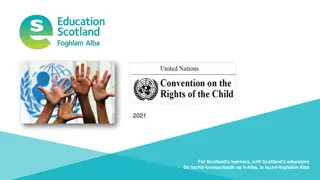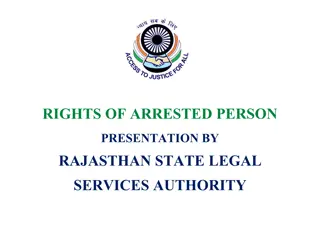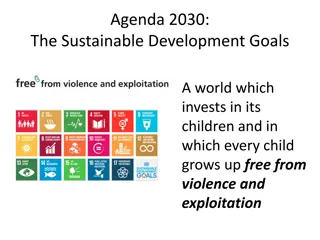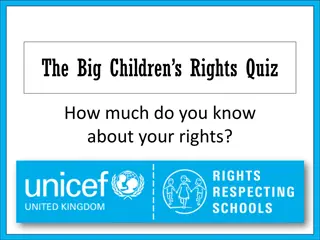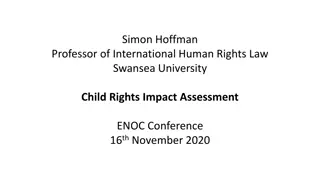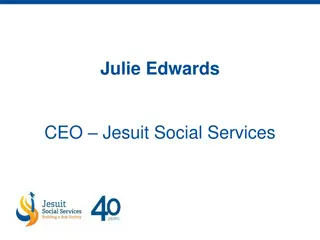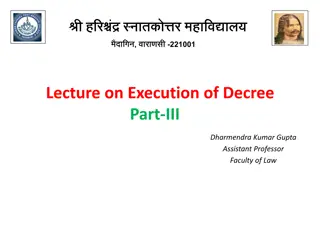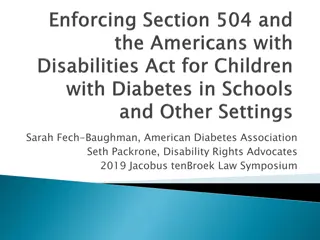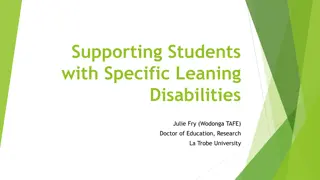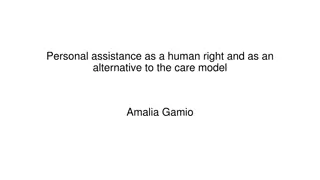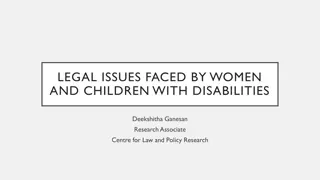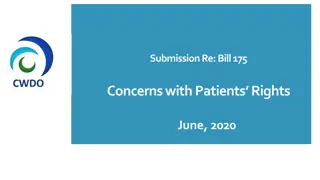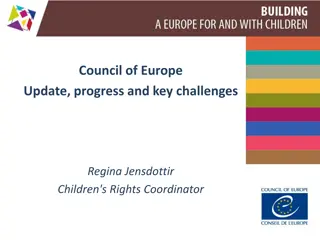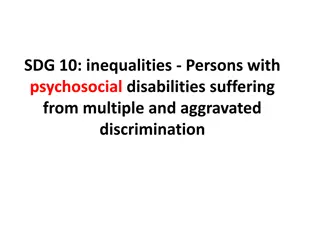Supporting Children with Disabilities in Child Detention: International Rights Standards
Professor Ursula Kilkelly highlights the importance of adhering to international standards such as the CRPD and CRC when supporting children with disabilities in child detention. The research emphasizes the need for age-appropriate accommodations, individual assessments, and child-friendly justice practices. Findings indicate that children with disabilities face communication and understanding barriers within the justice system, emphasizing the need for tailored support and training for legal professionals.
Download Presentation

Please find below an Image/Link to download the presentation.
The content on the website is provided AS IS for your information and personal use only. It may not be sold, licensed, or shared on other websites without obtaining consent from the author.If you encounter any issues during the download, it is possible that the publisher has removed the file from their server.
You are allowed to download the files provided on this website for personal or commercial use, subject to the condition that they are used lawfully. All files are the property of their respective owners.
The content on the website is provided AS IS for your information and personal use only. It may not be sold, licensed, or shared on other websites without obtaining consent from the author.
E N D
Presentation Transcript
Professor Ursula Kilkelly Supporting Children with Disabilities in Child Detention International Rights Standards Research and Data Oberstown Approach Key Messages
International Standards: CRPD International Standards: CRPD Article 13 requires effective access to justice including through the provision of procedural and age-appropriate accommodations in all legal proceedings Appropriate training for those working in the field, including police and prison staff. Article 7 requires full enjoyment of children s rights, including child s best interests and right to be heard, including disability and age appropriate assistance to realise that right
International Standards: CRC International Standards: CRC CRC Article 37 - detention as a last resort Article 40 - extensive provision for child s rights in justice proceedings Article 2 - right to equal enjoyment of rights, includes disability ground General Comment No 24 (2019), paras 28, 40, 46: requirement of individual assessment of need and circumstances Emphasis on training and inspection
International Standards: Guidelines on CFJ International Standards: Guidelines on CFJ Sets out how states are to provide for a child s rights in the justice system Child-friendly justice is justice that is: accessible; age appropriate; speedy; diligent; adapted to and focused on the needs of the child; respects the right to due process; respects the right to participate in and to understand the proceedings; respects the right to private and family life; respects the right to integrity and dignity.
Research Research Research indicates that learning difficulties can increase the chance of a child coming into conflict with the law (Baldry et al, 2018; Mendoza et al, 2020), with school discipline policies and labelling (Kemshall, 2006) playing an important role Also evident in our recent analysis of GUI data where learning difficulties are positively associated with children in conflict with the law (Kilkelly et al, forthcoming) Children with disabilities face additional obstacles navigating the justice system communication and understanding Emerging understanding of barriers young people face to communication and understanding = particular issue in police questioning and court processes (eg Talking Trouble)
UN Global Study 2019 UN Global Study 2019 First international study documenting the use and conditions of children deprived of liberty Important emphasis on children with disabilities Detention used as a means to access services and supports Stigma and misconceptions often lie at the root of the problem Disability-specific forms of deprivation of liberty Heightened risk of harm, neglect and abuse
Law and Policy Landscape Law and Policy Landscape Children Act 2001 A progressive youth justice system, with welfare focus throughout Strong emphasis on diversion at all stages and important emphasis on communication and understanding But rare reference to disability is in Part 6 Garda Custody (s 55) Youth Justice Strategy Supports progressive development of youth justice, with identification of disability as a cross-cutting factor
Oberstown Children Detention Campus Oberstown Children Detention Campus 2019 Q1 Data indicates that of 75 young people: 31 had a mental health need (23 with CAMHS involvement) 43 had not engaged in detention prior to admission 17 had a diagnosed learning disability, of whom 10 were not engaging in education prior to admission 12 exhibited challenging behaviour 14 had mental health needs
Oberstown approach Oberstown approach Established model of care and new Children s Rights Policy Framework CEHOP: Care, Health, Education, Offending behaviour, Preparation for leaving Individual assessment of need on admission Personalised care plan, development and behaviour supports ACTS (incl speech and language therapy; psychology) and FCAMHS Keyworker and social care approaches Participation and consultation in individual, unit and Campus decision- making At School, individualised Education Plan, 3:1 ratio and educational supports
Key Messages Key Messages Children with disabilities are over-represented in the justice system Challenges navigating the system and having needs met Evidence points to the importance of an individualised approach and to basic supports that ensure needs are met to avoid system contact Need for greater visibility of disability in the youth justice system and in detention training and inspection could be improved How often do we hear from children with disabilities in this area?



